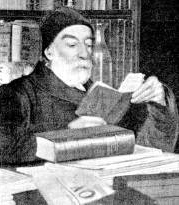Charles Bernard Renouvier
| Charles Renouvier | |
|---|---|
 |
|
| Born |
January 1, 1815 Montpellier |
| Died | September 1, 1903 (aged 88) Prades, Pyrénées-Orientales |
| Alma mater | École Polytechnique |
| Era | 19th-century philosophy |
| Region | Western Philosophy |
| School | Critical philosophy |
|
Main interests
|
Metaphysics |
|
Notable ideas
|
Néo-criticisme |
|
Influences
|
|
|
Influenced
|
|
Charles Bernard Renouvier (French: [ʁənuvje]; January 1, 1815 – September 1, 1903) was a French philosopher.
Charles B. Renouvier was born in Montpellier and educated in Paris at the École Polytechnique. He took an early interest in politics. Renouvier never held public office, spending his time writing, away from public scrutiny.
Renouvier was the first Frenchman after Nicolas Malebranche to formulate a complete idealistic system, and had a vast influence on the development of French thought. His system is based on Immanuel Kant's, as his chosen term "néo-criticisme" indicates; but it is a transformation rather than a continuation of Kantianism.
The two leading ideas are the dislike of the "unknowable" in all its forms, and a reliance on the validity of personal experience. The former accounts for Renouvier's acceptance of Kant's phenomenalism, combined with rejection of the thing-in-itself. It accounts, too, for his polemic on the one hand against a Substantial Soul, a Buddhistic Absolute, an Infinite Spiritual Substance; on the other hand against the no less mysterious material or dynamic substratum by which naturalistic Monism explains the world. He holds that nothing exists except presentations, which are not merely sensational, and have an objective aspect no less than a subjective. To explain the formal organization of our experience he adopts a modified version of the Kantian categories.
The insistence on the validity of personal experience leads Renouvier to a yet more important divergence from Kant in his treatment of volition. Liberty, he says, in a much wider sense than Kant, is man's fundamental characteristic. Human freedom acts in the phenomenal, not in an imaginary noumenal sphere. Belief is not intellectual merely, but is determined by an act of will affirming what we hold to be morally good.
In his religious views Renouvier makes a considerable approximation to Gottfried Leibniz. He holds that we are rationally justified in affirming human immortality and the existence of a finite God who is to be a constitutional ruler, but not a despot, over the souls of men. He nevertheless regards atheism as preferable to a belief in an infinite Deity.
...
Wikipedia
